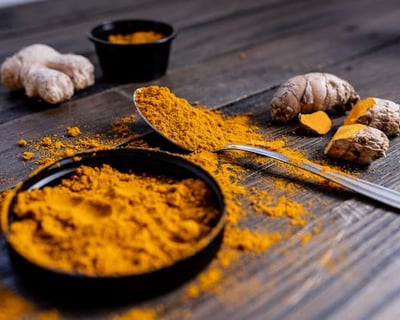

Turmeric, often hailed as the "golden spice," is far more than just a culinary ingredient. Native to Southeast Asia, particularly India, its history spans over 4,000 years, deeply interwoven with ancient Vedic culture and traditional medicine systems like Ayurveda.In Sanskrit, the most common and widely recognized name for turmeric is हरिद्रा (Haridra). This vibrant yellow rhizome, scientifically known as Curcuma longa, owes its potent properties to curcumin, a bioactive compound renowned for its strong anti-inflammatory and antioxidant effects. Beyond lending its distinctive color and earthy flavor to countless dishes worldwide, especially curries, turmeric has been revered for its medicinal benefits, believed to aid digestion, boost immunity, and even promote skin health
Turmeric is known by various names, reflecting its widespread cultural integration:
Hindi: हल्दी (Haldi)
Malayalam: മഞ്ഞൾ (Manjal)
Marathi: हळद (Halad)
Kannada: ಅರಿಶಿಣ (Arishina) or ಮಂಜಳ್ (Manjaḷ)
Spanish: Cúrcuma (KOOR-koo-mah)
French: Curcuma (koor-koo-MAH)
German: Kurkuma (koor-KOO-mah)
Italian: Curcuma (KOOR-koo-mah)
Chinese (Mandarin): 姜黄 (jiāng huáng) (jyang hwahng)
Japanese: ターメリック (tāmerikku) (taa-meh-reek-koo) -Another common term is ウコン (ukon) (oo-kon).
Arabic: كُرْكُم (kurkum) (koor-koom) or هُرْد (hurd)
Here are some of the key health benefits of cardamom:
Powerful Anti-inflammatory: This is perhaps turmeric's most celebrated benefit. Chronic inflammation is linked to numerous diseases, including heart disease, metabolic syndrome, cancer, and Alzheimer's. Curcumin can significantly reduce inflammation by inhibiting various molecules involved in inflammatory pathways.
Strong Antioxidant: Turmeric is rich in antioxidants, which protect the body from damage caused by free radicals. Free radicals contribute to aging and many diseases. Curcumin neutralizes these harmful molecules and can also boost the body's own antioxidant enzyme activity.
Aids Digestion: Turmeric has traditionally been used to support digestive health. It may stimulate bile production, which is essential for fat digestion, and its anti-inflammatory properties can soothe gastrointestinal discomfort.
Boosts Immunity: Turmeric's anti-inflammatory, antioxidant, and antimicrobial properties contribute to a stronger immune system, helping the body fight off infections and diseases.
Turmeric Fingers (Whole): These are the dried rhizomes, often polished or unpolished. Grading for fingers typically considers
Size: Length and thickness (e.g., 5-6 mm, 7-8 mm, 9-10 mm, or larger).Appearance: Uniformity, color (bright yellow to orange-yellow), minimal defects (broken, shriveled, insect damage).
Origin/Variety: Specific regions are known for certain qualities (e.g., Erode, Lakadong, Nizamabad, Rajapuri from India, often with GI tags).
Turmeric Bulbs: These are the rounder, more bulbous parts of the rhizome.
Turmeric Powder: Ground turmeric is graded based on fineness: How well it's ground. Color: Consistent yellow/orange.
Turmeric
Medical Disclaimer
This information is for general knowledge only and isn't medical advice. It's not a substitute for professional medical consultation. Always consult your doctor or another qualified healthcare provider with any health concerns or before starting any new treatment.


Turmeric
Medical Disclaimer
This information is for general knowledge only and isn't medical advice. It's not a substitute for professional medical consultation. Always consult your doctor or another qualified healthcare provider with any health concerns or before starting any new treatment.
Services
Exporting quality Indian spices, oils and trade services.
© 2025. All rights reserved.
contactusgtsi@gmail.com
Coming Soon
GST NO: 27abcfg5560a1ZR IEC : abcfg5560a
